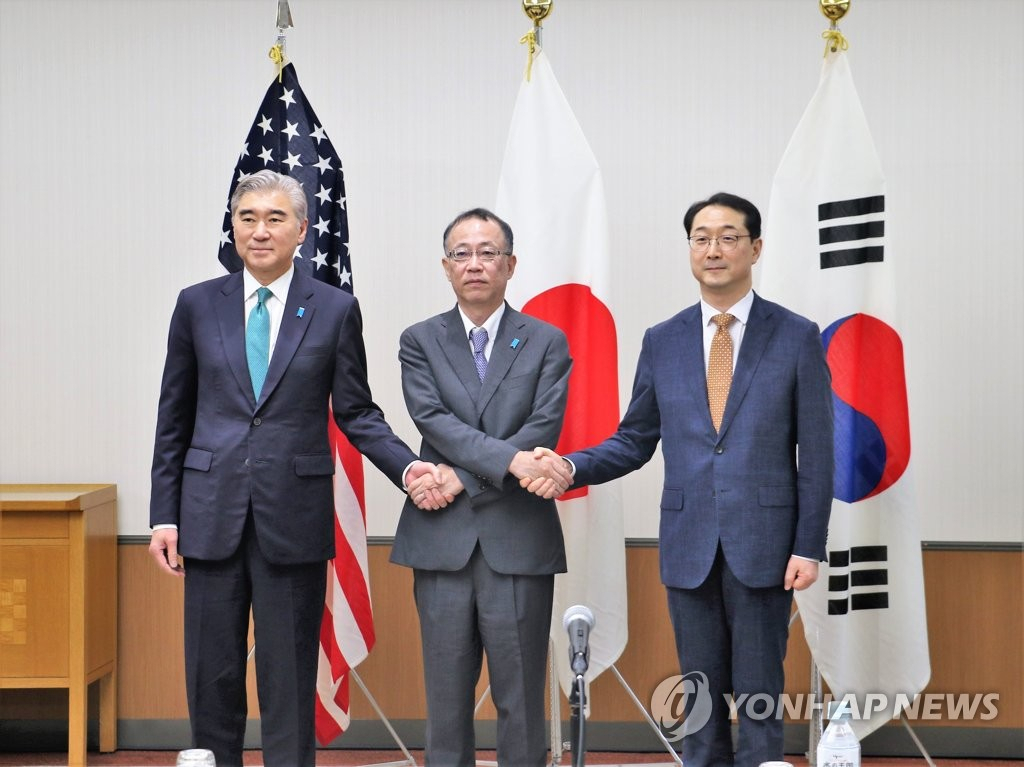Top nuclear envoys of S. Korea, U.S., Japan denounce N. Korea's latest missile test
By YonhapPublished : July 20, 2023 - 20:58

The top nuclear negotiators of South Korea, the United States and Japan met in Japan on Thursday and strongly condemned North Korea's recent ballistic missile launch, Seoul's foreign ministry said.
Kim Gunn, special representative for Korean Peninsula peace and security affairs, and his U.S. and Japanese counterparts, Sung Kim and Takehiro Funakoshi, respectively, delivered the message at a trilateral meeting in Karuizawa, a day after Pyongyang fired two short-range ballistic missiles into the East Sea.
The three sides discussed ways to "effectively counter" North Korea's continued provocations and agreed to step up efforts to prevent illicit revenue from flowing into the North's weapons development programs, the ministry said.
"Kim Jong-un thought that by heightening threats of a nuclear attack, he will gain respect and have things his way," the South Korean envoy said. "However, instead of being intimidated or conceding, the ROK and the U.S. have upgraded the Alliance through the Washington Declaration."
Kim criticized the North Korean regime for pushing for self-reliance and draining its scarce resources through its nuclear and missile programs.
"To put it simply, Kim Jong-un has reached a dead end," he said.
Kim called the allies' recently launched Nuclear Consultative Group (NCG) "particularly meaningful" for enhancing their combined deterrence and response posture.
During their April summit, President Yoon Suk Yeol and U.S. President Biden adopted the Washington Declaration and agreed to establish the NCG to discuss nuclear and strategic planning between the allies and strengthen the credibility of the U.S. extended deterrence commitment to defending South Korea with all of its military capabilities, including nuclear weapons.
The envoys also reaffirmed that the three countries remain open to dialogue with North Korea and agreed to strengthen "close communication and coordination to bring North Korea back to the path to denuclearization."
Kim also met separately with Funakoshi and denounced the North's "unprecedented" number of nuclear and missile provocations, the ministry said.
"The two sides agreed to step up efforts in strengthening the international community's strict implementation of United Nations Security Council (UNSC) resolutions on North Korea and in calling for China's constructive role, making use of the fact that South Korea, the U.S. and Japan will all serve as members of the UNSC next year," it added.
The meeting comes after the UNSC failed to take action on North Korea for its intercontinental ballistic missile test last week due to opposition from China and Russia. (Yonhap)












![[Kim So-hyun] The quiet taxi driver from Paris](http://res.heraldm.com/phpwas/restmb_idxmake.php?idx=644&simg=/content/image/2024/04/25/20240425050891_0.jpg&u=)







